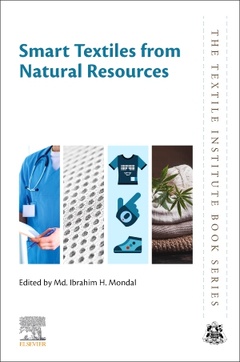Description
Smart Textiles from Natural Resources
The Textile Institute Book Series
Coordinator: Mondal Md. Ibrahim H.
Language: English
Subjects for Smart Textiles from Natural Resources:
Publication date: 04-2024
926 p. · 15x22.8 cm · Paperback
926 p. · 15x22.8 cm · Paperback
Description
/li>Contents
/li>Biography
/li>Comment
/li>
Smart Textiles from Natural Resources is an interdisciplinary guide for best practices and emerging challenges in the use of natural textiles in smart applications. The movement towards smart textiles has attracted researchers from many fields creating multidisciplinary research frontiers with nanoscience, smart materials and structures, microelectronics, and wireless communication. This groundbreaking book provides technical advice and foundational support to researchers from all of these backgrounds. Each chapter in is written, reviewed, and edited to cover the principles of manufacture, process techniques and mechanisms, and state-of-the-art construction specifications, properties, test methods, and standards of major product areas and applications.
1. An introduction to smart textiles and clothing2. Fabric structures, design and their impact on smart clothing 3. Cotton and other cellulose fibres for comfort smart clothing and applications 4. Silk and wool as smart materials for medical textiles 5. Dyeing and active coatings for smart textiles 6. Nanotechnology-based functional finishing for smart textiles and applications 7. Electrospun nanofibres for electronic devices and their applications 8. Thermal regulation of electrically conducting fabrics 9. Processings techniques, test methods and regulatory standards of smart textiles 10. Smart bio-textiles for medicine and healthcare 11. Intelligent clothing for prehospital emergency care 12. Smart medical textiles for monitoring heart conditions 13. Smart medical clothing for disabled and aged people 14. Phase change and shape memory materials in smart medical textiles 15. Psychotextiles and their interaction with the human brain 16. Smart textiles for infection control and wound management 17. Microencapsulation technology for smart textile coatings 18. Smart wearable clothing – Production and applications 19. Smart bio-geotextiles and its applications 20. Architectural applications of smart textiles 21. Smart bio-textiles for automotive applications 22. Color-changing and photonic tunable smart textiles and their applications 23. Smart textiles in sensors, actuators and computing systems 24. Biomimetic approaches to the design of smart textiles 25. High-performance smart textiles for construction and geo-technical applications 26. Fabric joining technologies for smart clothing 27. Applications of smart clothing in communication technology 28. Smart textiles for digital printing technology Environmental aspects, health issues and waste management of smart textile products
Md. Ibrahim H. Mondal is a Professor and Chairman in the Department of Applied Chemistry and Chemical Engineering at the University of Rajshahi, Bangladesh. He was a Commonwealth Visiting Scholar at the University of Manchester Institute of Science and Technology (UMIST) in the United Kingdom during 2003-04, a Visiting Professor at the Hokkaido University in Japan during 2006-07, and a Visiting Scientist at the Universiti Sains Malaysia, Malaysia during 2009-10. In 2018, he was awarded the UGC Gold Medal of the University Grants Commission of Bangladesh (UGC) by the President, and in 2020, he won the Dean's Award. Natural Fibres, Biofilms, Biopolymers, and Biocomposites, Cellulose & Derivatives, Superabsorbent Hydrogels, Biomaterials, Smart fibres, Nanomaterials in Textiles, Microbial Cellulose, Textile Modification, Functional Textiles, and Textiles-wet Processing are his research areas. He has over 170 research articles
and book chapters, as well as 13 books to his credit as an author, co-author, or editor.
and book chapters, as well as 13 books to his credit as an author, co-author, or editor.
- Covers a wide variety of novel applications of smart textiles, including medical, protective, and automotive
- Proposed solutions are based on case studies from academic and industrial labs around the world
- Explains how to improve the biodegradability, renewability, biocompatibility, and non-toxicity of smart products
© 2024 LAVOISIER S.A.S.
These books may interest you

Handbook of Fire Resistant Textiles 264.10 €



